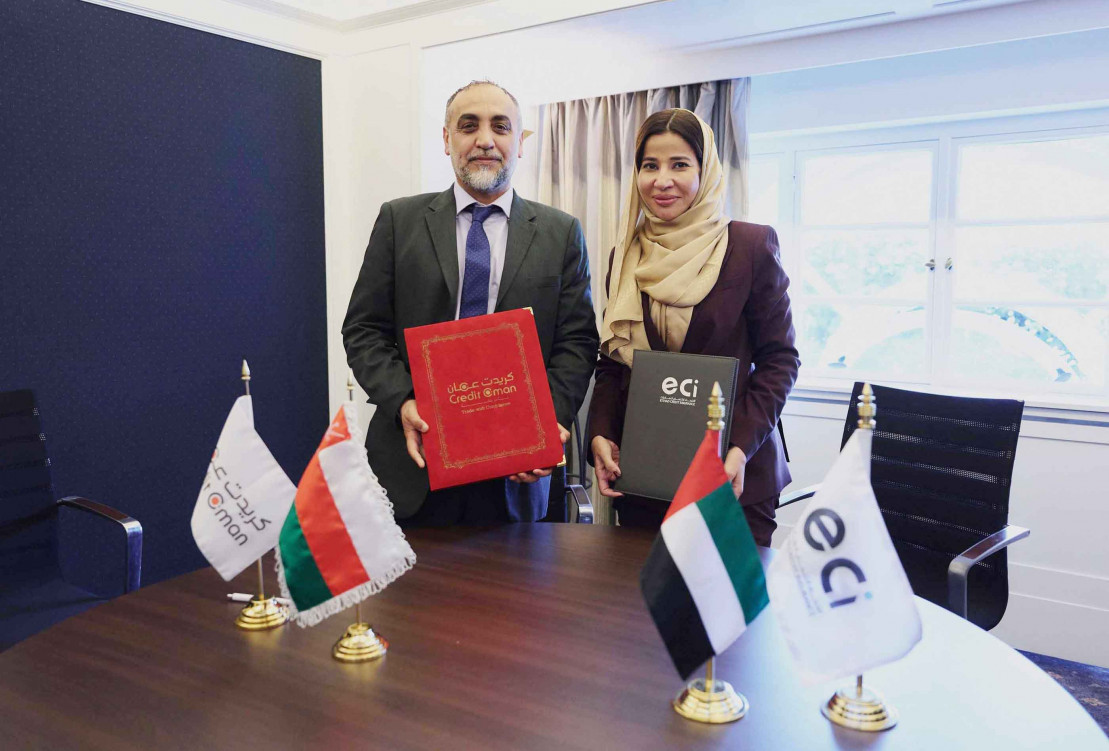
News
ECI signs two MoUs with Saudi Exim Bank and Credit Oman
On the sidelines of the Berne Union Annual General Meeting
Etihad Credit Insurance signs two MoUs with Saudi Exim Bank and Credit Oman
17 October 2024: Etihad Credit Insurance (ECI), the UAE’s federal export credit company, signed two Memorandums of Understanding (MoU) with Saudi EXIM Bank and Credit Oman during its participation in the Annual General Meeting of Berne Union, in Hamburg, Germany.
The MoUs seek to strengthen regional partnerships and collaboration in a number of areas related to insurance and risk management. This includes trade credit insurance (conventional and Murabaha), which provides the UAE exporters with insurance against commercial and non-commercial risks, along with insurance against individual buyer risks. The cooperation also extends to supply risks, exports financing, debt sales, SME financing, confirmation of letters of credit, and corporate finance.
In this regard, Her Excellency Raja Al Mazroui, CEO of Etihad Credit Insurance (ECI), highlighted how the new partnerships with Saudi EXIM Bank and Credit Oman represent a leap forward in developing the export credit system, and enhancing the prospects of foreign trade and investment. Her Excellency noted that these agreements represent ECI's commitment to fortify collaboration and establish alliances with leading regional institutions in credit sectors. This, in turn, fosters confidence in the local export system, helps introduce products of Emirati origin to a broader range of international markets, and solidifies the UAE's position as a vital hub for global trade and investment.
Her Excellency added, “We are committed to developing cooperation and partnerships with our counterparts in the GCC countries, especially in the areas of trade credit insurance, export financing, and risk management. Our goal is to provide a safe and flexible investment environment that supports export and re-export companies based in UAE and strengthens the competitive advantage of the local non-oil commodity. We hope that our collaboration will contribute to the sustainability and diversity of GCC economies, as well as encourage companies in the UAE, Saudi Arabia, and Oman to close agreements with importers and buyers in international markets.”
His Excellency Eng. Saad bin Abdulaziz Al-Khalb, CEO of Saudi EXIM Bank, said: “Through this MoU we seek to open promising trade and investment horizons between the Kingdom of Saudi Arabia and the United Arab Emirates, by strengthening and developing the export and import sector, developing business and investment opportunities, and supporting commercial projects in a way that benefits economic growth on both sides. This MoU is also an extension of the solid foundations of economic and trade relations between the two countries. We at the Saudi Exim and (ECI) will certainly work together to strengthen the non-oil economy in a way that supports diversity and sustainability and provides added value to enhance trade exchange between the Gulf Cooperation Council countries and consolidate their position and international commercial strength.”
Sheikh Khalil bin Ahmed Al-Harthy, CEO of Credit Oman, stated, “The latest MoU with Etihad Credit Insurance demonstrates our commitment to strengthening regional cooperation in the fields of insurance and risk management. The collaboration helps build trust in the export credit system, allowing exporters from the Sultanate of Oman and UAE to access new markets and enhance their competitiveness, as well as boost exports between the two countries.”
He added, “Along with that, the agreement creates new opportunities for businesses, especially in the field of trade credit insurance. We believe that this step will help create a safe and flexible investment environment, which in turn strengthens and promotes diversification of the economies of the Gulf Cooperation Council (GCC) countries.”
According to statistics issued by the National Center for Statistics and Information, the United Arab Emirates led trade exchange operations in non-oil exports by the end of July 2024, with a value of approximately OMR 558 million, an increase of 14.9 per cent from the same period in 2023, which was OMR 486 million. Al-Harthy stated that Credit Oman's total insured sales to the UAE in the first half of this year amounted to OMR 41.1 million, with a growth rate of 8.8 per cent compared to the same period last year, which stood at OMR 38.6 million. Building and construction materials, valued at OMR 17.3 million, followed by the petrochemicals and plastics sector valued at OMR 12.6 million, and the food and consumer goods sector valued at OMR 6.7 million, became the top three insured sectors.
The MoUs stipulate joint participation in conferences, meetings, and related activities, as well as the organisation of seminars and workshops to highlight the advantages of trade protection solutions against the risks of non-payment, with an emphasis on suggested solutions. They also specify the submission of a report on market or country risks to highlight commercial risks associated with international trade activities.
In line with the objectives and pillars of the ‘Saudi Vision 2030,’ which aims to raise the percentage of non-oil exports to non-oil GDP, Saudi EXIM Bank offers competitively advantageous credit solutions for export financing, guarantees, and export credit insurance. The bank's goal is to boost Saudi Arabia’s non-oil exports and increase its competitiveness in global markets across various sectors. By bridging financing gaps and lowering export risks, the bank aims to empower the Saudi non-oil economy and enable its exports to reach global markets.
Since its establishment, ‘Credit Oman’ has played a pivotal role in facilitating domestic and export trade, supporting economic development efforts in the Sultanate of Oman in line with the Oman Vision 2040. It also provides comprehensive insurance solutions that empower Omani exporters and manufacturers to sell their products with confidence and security, thereby enhancing the competitiveness of Omani products in both local and global markets.




